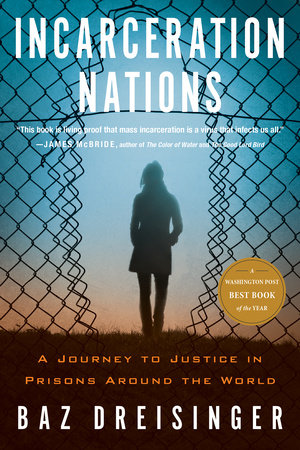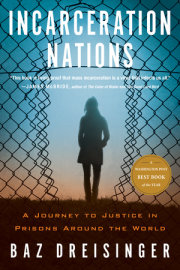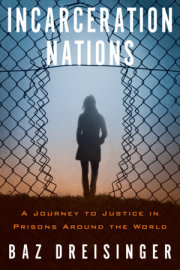"Powerful...Dreisinger carries out an incisive inquiry into the standards for a just society’s humane treatment of its prisoners." —Publishers Weekly
“Incarceration Nations is an important book, one that pulls back the curtain on a global human tragedy that, for most of us, is hidden from view. The author’s unique ability to draw out the humanity in even the most troubled of souls reflects the passion and understanding she brings to her work. Her Prison-to-College Pipeline program, like her writing class in Uganda and drama workshop in Thailand, is a beacon of light that illuminates a stepping stone on a path to change.”—Woman Around Town
“In a world where mass incarceration has reached levels of near insanity, Dresinger’s stirring work offers new ideas in an area that seems to be starving for them. This book is a more than a cry for massive overhaul in prison reform, it gives voice to the silent millions of men and women who live behind prison walls on every continent, and whose suffering is a reflection of our own inhumanity and fear. Forgiveness, payback, restoration, these are the words peppered throughout this well-written work of redemption and identity. This book is living proof that mass incarceration is a virus that infects us all.” —James McBride, author of The Color of Water andThe Good Lord Bird
“Incarceration Nations sheds important light on the ways that justice systems around the world are similar, as well as their unique aspects. It uncovers both their most horrifying and hopeful parts. Offering historical investigation and myriad facts, and complementing that research with personal experiences and stories of human beings, the book captures the reader into more inquiry about this vast and critical subject. This is a great read for both students of criminal justice, as well as citizens of the world.” —Debbie Mukamal, Executive Director, Stanford Criminal Justice Center, Stanford Law School
“Despite tacit awareness that the prison crisis is global and that the global prison’s modern form is US-generated, work on incarceration is almost always limited by national context. The work of gaining access and trust, of studying multiple intricate systems and national contexts, of traveling long distances and juggling multiple exchanges—while achieving depth of focus—is surely too great for one scholar. Or so it would seem. Dreisinger’s Incarceration Nations, which documents prisons on four continents, appears to do the impossible. It's a vital work—part memoir, part scholarly excavation—that manages to inspire even as it chronicles some of the world’s most horrific places. Dreisinger’s long history of work with the currently and formerly incarcerated is the perfect background and material for weaving an account that asks all of the right questions, setting us on a path while acknowledging that answers are really just the ground for asking anew.” —Gina Dent, Associate Professor and Chair, Feminist Studies, UC Santa Cruz
"In Incarceration Nations, Baz Dreisinger makes a truly important contribution to the discussion of one of America's most notorious exports—prisons. Observing the American penal landscape through the lens of prisons in nine diverse countries, Dreisinger is able to feel sympathy for both victims and prisoners while showing that nations from Uganda to South Africa to Australia expect more than just punishment and warehousing out of their corrections systems. As deplorable as the conditions in some of those prisons are, America can learn a lot from Incarceration Nations about how to tackle our own mass incarceration dilemma." —Vincent Schiraldi, Senior Advisor, NYC Mayor's Office of Criminal Justice
“Incarceration Nations is required reading for anyone concerned about the severity of punishment in America, and that should be all of us. Baz Dreisinger traces our legacy of mass incarceration around the globe. She does it with honesty, courage, and humility over the size of the problem, and yet she finds magical possibilities everywhere she goes when the imprisoned are treated as real persons. There are answers. This book says we can find them.” —Robert A. Ferguson, George Edward Woodberry Professor of Law, Literature, and Criticism, Columbia University









